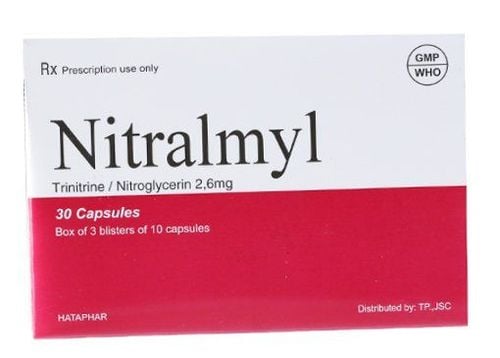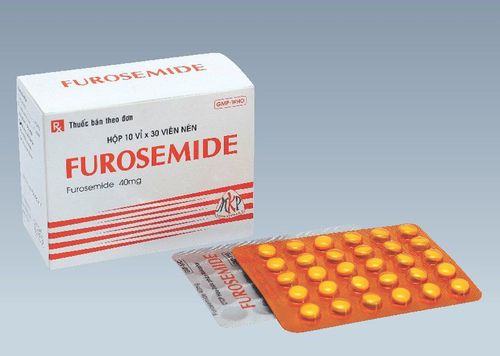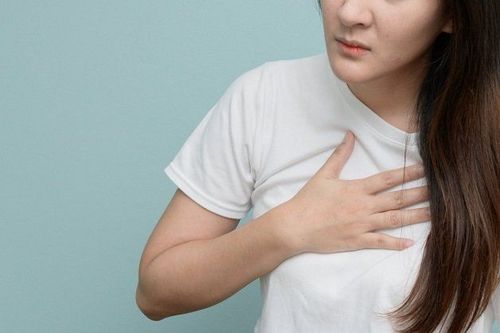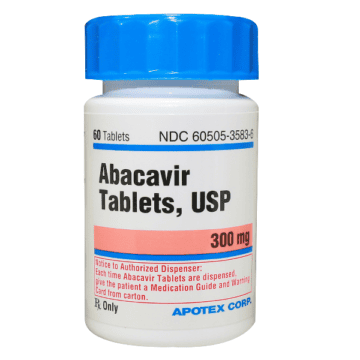This is an automatically translated article.
Tachycardia is a heart rate above 100 beats per minute at rest. Depending on the cause and how difficult it is for the heart to work, a fast heart rate can be dangerous. Some people have asymptomatic tachycardia and the complications do not progress. However, a fast heart rate can increase your risk of stroke, heart failure, sudden cardiac arrest, and death.
1. What are the typical symptoms of tachycardia?
When the heart beats too fast, it may not pump enough blood to the rest of the body. This can de-oxygenate your organs and tissues and can cause the following signs and symptoms associated with tachycardia:
Shortness of breath Lightheadedness Feeling of palpitations Chest tightness Fainting Some people tachycardia has no symptoms and is discovered only during a physical exam or an electrocardiogram.
2. Is tachycardia dangerous?
On heart health forums, social networking sites, it is easy to come across questions like “Is tachycardia dangerous? ”, “Is 120 heart rate dangerous? ", "What is tachycardia? “...
Sometimes, a fast heartbeat is normal. For example, it is normal for the heart rate to increase during exercise or in response to stress, injury, or illness.

Nhịp tim nhanh có thể là biểu hiện của bệnh lý tim mạch
Tachycardia becomes pathological when the heart beats faster than normal due to conditions unrelated to normal physiological stress. In some cases, tachycardia may not cause symptoms or complications. However, if left untreated, tachycardia can disrupt the normal function of the heart and lead to serious complications, including:
Heart failure Stroke Sudden cardiac arrest or death Treatment methods Treatment, such as medication, medical procedure, or surgery, can help control tachycardia or manage related conditions that cause tachycardia.
3. Types of tachycardia
There are different types of tachycardia. They are classified according to the part of the heart responsible for the tachycardia and the cause of the abnormally fast heartbeat. Common types of tachycardia include:
Atrial fibrillation: Atrial fibrillation is a fast heartbeat caused by chaotic, irregular electrical impulses in the upper heart chambers (atria). These signals cause the atria to contract faster, uncoordinated, and weakly. Atrial fibrillation can be a temporary condition, but some episodes will not go away without treatment. Atrial fibrillation is the most common type of tachycardia.
Atrial flutter: In atrial flutter, the atria usually beat very quickly but steadily. The fast beating rate causes the atria to contract weakly. Atrial flutter is caused by irregular pulses in the atria. Atrial flutter episodes may resolve on their own or may require treatment. People with atrial flutter also often have atrial fibrillation at other times.
Supraventricular tachycardia (SVT). Supraventricular tachycardia is an abnormally fast heartbeat that begins somewhere above the lower heart chambers (ventricles). It is usually caused by abnormal blood vessels in the heart that are usually present at birth and create a loop of overlapping signals. Ventricular tachycardia: Ventricular tachycardia is a fast heartbeat that begins with abnormal electrical impulses in the lower heart chambers (ventricles). The tachycardia does not allow the ventricles to fill with blood and contract effectively to pump enough blood to the body. Episodes of ventricular tachycardia can be short and last for only a few seconds without causing harm. But episodes lasting longer than a few seconds can be medical emergencies and life-threatening.
Ventricular fibrillation: Ventricular fibrillation occurs when rapid, chaotic electrical impulses cause the lower heart chambers (ventricles) to vibrate instead of pumping the blood needed to the body. This can be fatal if the heart is not restored to a normal rhythm within minutes with an electric shock (defibrillation). Ventricular fibrillation can occur during or after a heart attack. Most people with ventricular fibrillation have a history of heart disease or have experienced serious trauma, such as being struck by lightning.
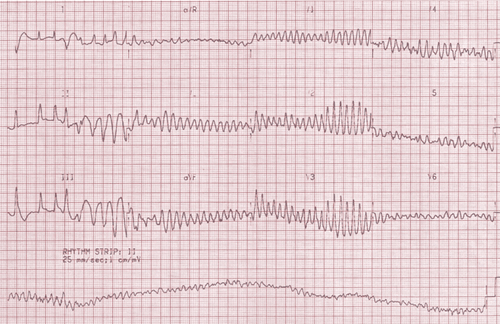
Hiện tượng "R trên T" gây xoắn đỉnh trên bệnh nhân rung thất
4. What causes tachycardia?
Tachycardia is caused by interruptions in the normal electrical impulses that control how fast the heart pumps blood. Direct or indirect causes of tachycardia include:
Anemia Drinking too much caffeinated beverages Drinking too much alcohol Exercise Fever High or low blood pressure Imbalance of electrolytes, essential substances to conduct electrical impulses Drug side effects Overactive thyroid gland (hyperthyroidism) Smoking Sudden stress, such as fear Using stimulant drugs, such as cocaine or methamphetamine In some cases, It is not possible to pinpoint the exact cause of the tachycardia.
5. Risk factors for tachycardia
Advanced age or a family history of tachycardia or arrhythmia are risk factors that are more likely to progress to tachycardia.
Any condition that puts stress on the heart or damages heart tissue can increase the risk of tachycardia. These factors include:
Anemia Diabetes Heart disease Heavy alcohol use High caffeine use High blood pressure An overactive or underactive thyroid Psychological stress or anxiety Apnea syndrome when sleeping Smoking Using stimulants Lifestyle changes or treatment for related health conditions can reduce the risk of tachycardia.
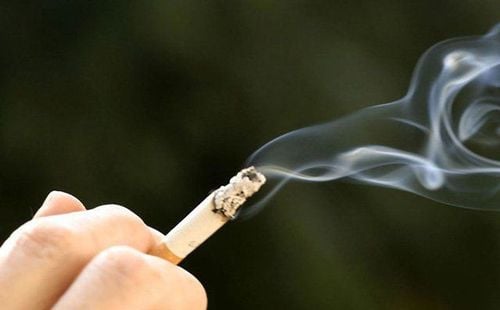
Hút thuốc lá là một trong các yếu tố nguy cơ khiến nhịp tim nhanh
6. What are the complications of tachycardia?
Complications of tachycardia depend on the type of tachycardia, how fast the heart beats, how long the tachycardia lasts, and the underlying cardiovascular disease.
Possible complications of tachycardia include:
Blood clots that can cause a heart attack or stroke Heart inability to pump an adequate amount of blood (heart failure) Frequent fainting or unconsciousness death, usually only associated with ventricular tachycardia or ventricular fibrillation
7. How to prevent tachycardia?
The most effective way to prevent tachycardia is to maintain a healthy heart and reduce your risk of developing heart disease. If you have a history of heart disease, monitor and follow your treatment plan to help prevent tachycardia. To treat or eliminate risk factors that can lead to heart disease, it's important to take steps to help prevent heart disease. following recommendations:Exercise and eat healthy. Maintain a heart-healthy lifestyle by exercising regularly and eating a healthy, low-fat diet rich in vegetables, fruits, and whole grains. Maintain a healthy weight. Being overweight increases your risk of developing cardiovascular disease. Keep blood pressure and cholesterol levels under control. Make lifestyle changes and take medications as prescribed by your doctor to correct high blood pressure (hypertension) or high cholesterol. Quit smoking. If you are a smoker and are unable to quit on your own, you should talk to your doctor about methods or programs to help you quit smoking. Drink in moderation: For healthy adults, drinking in moderation means up to one drink per day for women and up to two drinks per day for men. Do not use stimulants, such as cocaine. Use over-the-counter (OTC) medications with caution. Some cold and cough medicines contain stimulants that can cause a rapid heartbeat. Talk to your doctor about medications to avoid. Limit caffeine. If you have a habit of drinking caffeinated beverages, drink them in moderation (no more than one to two drinks per day). Stress management. Avoid unnecessary stress and learn coping strategies to reduce stress in a healthy way. Schedule a visit. Get regular check-ups and report any signs or symptoms to your doctor.

Định kỳ kiểm tra sức khỏe tim mạch giúp người bệnh được phát hiện và điều trị bệnh lý kịp thời
Monitor and treat existing heart disease: If you already have a history of cardiovascular disease, you can take steps to help prevent tachycardia or arrhythmia:
Follow the plan: Patient Make sure you understand your treatment plan and take all of your medications as directed. Report changes immediately: If symptoms change, get worse, or develop new symptoms, the patient should tell the doctor immediately. Please keep an eye on the website (www.vinmec.com) for more information on health care instructions, which we will update regularly.
Please dial HOTLINE for more information or register for an appointment HERE. Download MyVinmec app to make appointments faster and to manage your bookings easily.





